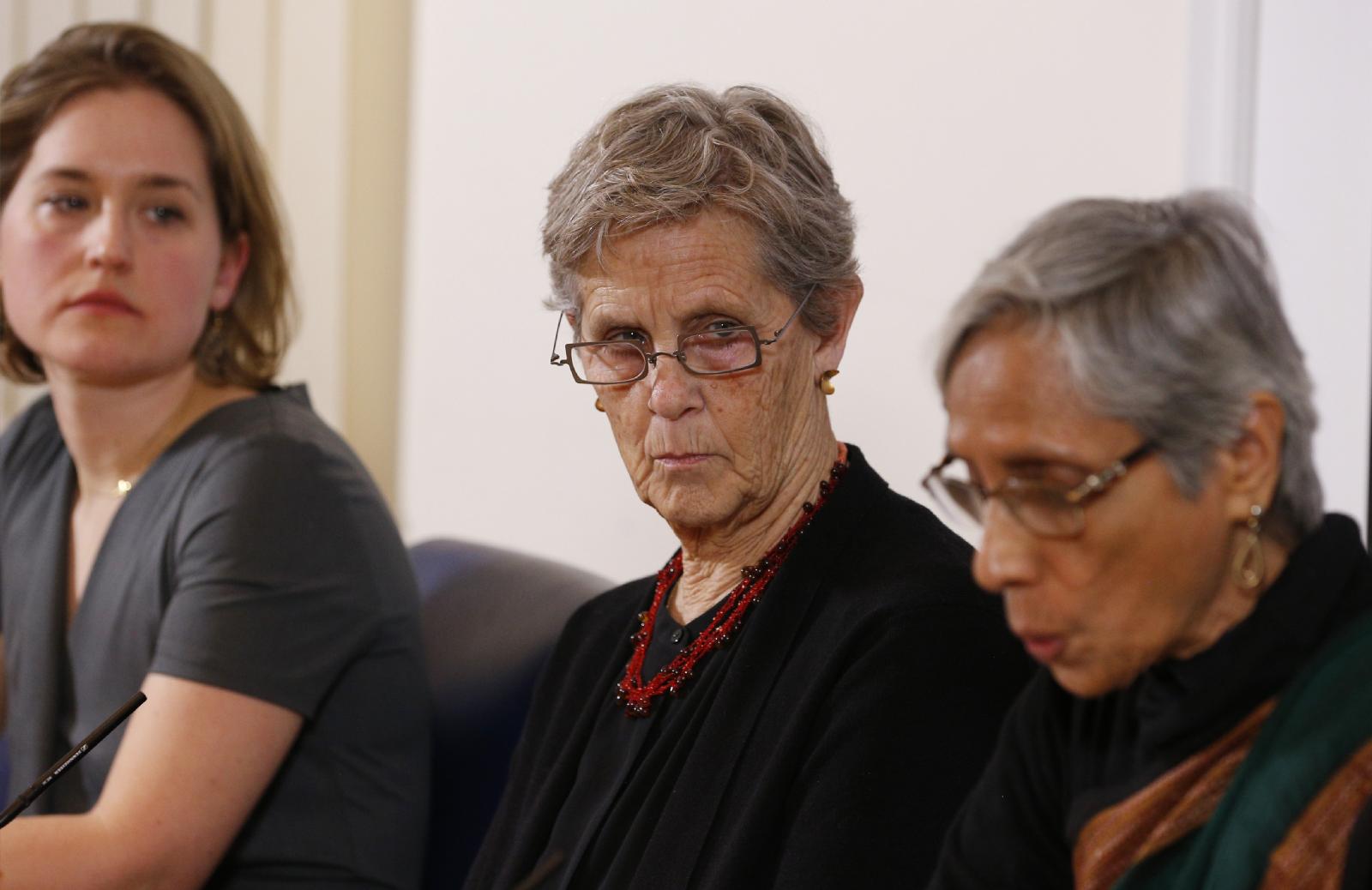Women of faith celebrated International Women’s day on Monday with discussions on women’s future in the Catholic Church and by exploring if women have been written out of scripture.
“We are talking about the survival of the Church,” said Joanna Moorhead, The Tablet’s Arts editor, who has written widely on the subject of women in the Church for publications including The Guardian, The Observer and The Times.
She told more than 200 participants in The Tablet’s webinar, Do Women have a future in the Catholic Church? that the issue was no longer a women’s issue but an issue for everyone. The question is – does the Church have a future without women?
“Of course it doesn't. The church has no future without us,” she stated. She also noted the implications of younger catholic women falling away as the Church needs a membership to survive.
During The Tablet’s webinar, Zuzanna Flisowska-Caridi of Voices of Faith recounted her experience of the German Church’s synodal path of reform.
The process has brought together lay people, religious and bishops to discuss four major topics: the way power is exercised in the Church; sexual morality; the priesthood; and the role of women in ministries and offices in the Church.
Zuzanna Flisowska-Caridi, who is part of the commission working on women’s issues, described her experience in Germany as “quite extraordinary”.
She said: “Obviously, the process has its limits. But for me, it's been a really wonderful experience in which lay people, theologians, male and, and female, religious sisters, are all sitting together at the one table, and they're really trying not to have this hierarchical view. Everyone has his or her voice.
“There are obstacles because we have different opinions but to see a religious sister having a sincere and honest discussion with a bishop, perhaps they’re not on the same page, perhaps they will not find the common point, but I think it’s a huge step forward that they sit there, and he is obliged to listen to her.”
She said the question that needed to be asked was how the German Church’s experience of the synodal path can be used by the global Church. The “big question is how we organise power in our Church”. It is “a question that the Church is really afraid of, but it is a question we cannot avoid any longer.” While welcoming the one female voting member at the synod of bishops in Sr Nathalie Becquart, she underlined that there was a need for “serious reorganisation” of these structures.
Joanna Moorhead highlighted how a group, Root and Branch, which had been formed following an article she wrote for the Tablet a number of years ago calling for a women’s synod is moving towards a first synod in the UK in September. The group is working internationally with Voices of Faith and Women’s Ordination Conference and other women’s group all over the world for change. “It’s about working out how to make sure we’re heard,” she said.
Kate McElwee, executive director of the Women’s Ordination Conference, and a member of the leadership circle of Women’s Ordination Worldwide, told the webinar that she felt the institutional Church’s “commitment to oppression is extremely devastating”.
She noted the findings of a recent survey by the Women’s Ordination Conference conducted among young Catholic women in the United States, aged 21 to 40, with a master of divinity or similar degrees.
“We asked them questions about their Catholic identity, their professional experience, and their vocational paths. Most of them expressed pain or frustration about the limits placed on them. The third most frequent response about the opportunities for women in the Catholic Church was ‘none’ or ‘inadequate’.”
Referring to Pope Francis’ call to the faithful to encounter people in a genuine way, she noted that he had stressed that in order to deeply understand and transform our relationships in the world we have to meet people and talk with them.
“So, I ask the same of him. Meet these women and young people and listen to their voices and honour their vocations, so that we can transform these structures that harm our entire human family,” Kate McElwee appealed.
Joanna Moorhead expressed regret that the Church has “so totally failed to seem relevant to the generation of my daughters” and added that she was worried for her grandchildren who would be unlikely to have to same connection with Catholicism as she or her daughters had. “I find that really sad,” she said.
Speaking about the need for the Church to give women a fuller role, Kate McElwee said: “I think the Church could be far more effective in the world and could really fulfil its social justice mission and live the Gospel if it recruited women in a full way. At every UN meeting you hear about the important role that women play in peace-making and grassroots organising and leadership at local level. The Church just continues to deny women that role. I think our work is really to get the Church to breathe with two lungs and to fly with two wings.”
Separately on Monday, the School of Divinity at Edinburgh University brought together academics, Dr Julia Snyder, Dr Hannah Holtschneider, Dr Sara Parvis, Dr Shadaab Rahemtulla and Professor Helen Bond to discuss the subject, Lost in Translation: Women in Scripture.
The International Women's Day event was chaired by Professor John Barton.
Dr Sara Parvis of Edinburgh University looked at the example of Junia referred to in St Paul’s Letter to the Romans, as a “particularly spectacular example of a New Testament woman, who was well known to be a woman, to those who spoke the common languages of the Roman Mediterranean, Latin and Greek, but who from the eighth century onwards, began to be reinterpreted as male, and hence, to be increasingly translated out of history as a woman.”
“This woman is now almost universally recognised to be a woman in modern English translations of the Bible, but a few lingering translations continue the misunderstandings of a former day and make her a man, among them the English Standard Version or ESV.”
According to Dr Parvis, by listening to the early Church Fathers, “Junia, the woman apostle, once lost, is now found”.
She said: “She is a salutary reminder of what happens when everything is judged against what one thinks one knows about what a woman could possibly do in the ancient world.
“The processes that led to her invisibility, as a woman, are perhaps extreme, particularly in the level of scholarly ingenuity employed in trying to demonstrate that modern authors know better than the Greek Fathers how to read their own language,” she criticised.
She also underlined that accuracy in translation is a term that is often paid lip service to, but it means more than word for word translation.
In her address, Dr Julia Synder of the University of Cambridge looked at the how the word Adelphoi in the New Testament should be translated and whether female followers of Jesus such as Lydia and Priscilla had sometimes been translated out of the story of the early Church.
“It’s not always clear who is responsible for leaving women out of the picture – is it the people creating modern translations of the Bible, or the original authors themselves?” she asked.



 Loading ...
Loading ...